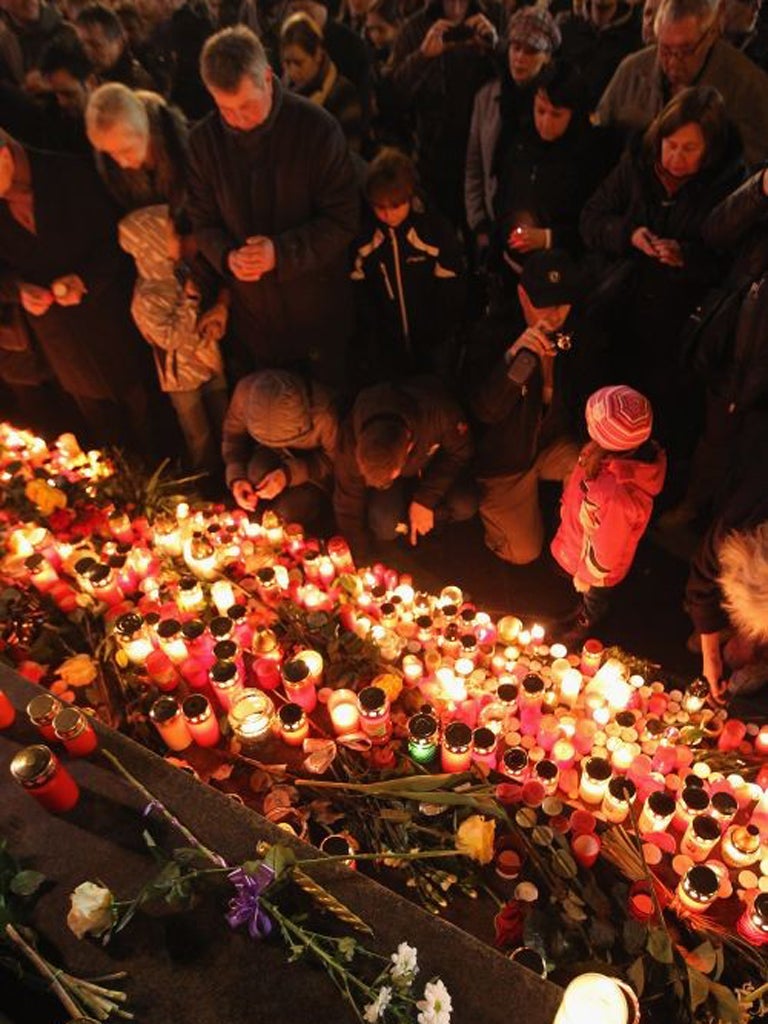Steve Crawshaw: Havel was a giant for Eastern Europe who must be remembered
Steve Crawshaw, who covered the Velvet Revolution for 'The Independent', recalls a leader with rare moral authority


He served as a reminder that politics and dignity do not need to be in contradiction.He believed always in what might be achieved, including the seemingly unachievable. Vaclav Havel never felt confined by those who mocked such a grand canvas. He was a moral giant for eastern Europe. His example deserves to be remembered worldwide.
Havel was acknowledged leader of Czechoslovakia's Velvet Revolution" in November 1989 – the most magical of all the revolutions in eastern Europe during that astonishing year. It was an extraordinary experience to stand amidst the vast crowds on Wenceslas Square, as hundreds of thousands forced an unbending regime to collapse like a house of cards, and as the crowds called for Havel na Hrad!¸– "Havel to the Castle!", the presidential buildings on the hill.
Hundreds of thousands of Czechs and Slovaks confronted official violence, jangling handbells and keys while chanting an old Czech phrase: "The bell is ringing. The story is over!" And so it was. Within barely a week, the hated and discomfited leaders were gone.
Havel wrote Power of the Powerless, one of the greatest political essays of all time, in 1978. In the essay, he talks of the importance of no longer living a lie, but learning to "live in truth", whatever the cost may be. He speculates on what such a simple, crazy idea might achieve, even in repressive circumstances. Havel describes an imaginary greengrocer who one day refuses the standard instructions to place an official, empty slogan "amidst his onions and carrots". The greengrocer will be punished for his insolence. But for Havel, living in truth can provide rewards of its own. And what, he wonders, if everyone were to take a similar small defiant step?
Last year, Havel generously wrote a preface for a book which I co-authored. He recalled how three decades ago he was mocked for the absurdity of believing that ordinary people could change anything. And yet, in the light November snow of Wenceslas Square 1989, the power of the powerless became real. Edward Lucas, then The Independent's correspondent in Prague, quoted a telephone engineer who protested for the first time in his life: "As I lay on the ground and police beat me... I felt free."
I first met Havel when I was working for The Independent and he was still under round-the-clock surveillance by the secret police. As we drank beer in his favourite restaurant by the river Vltava, he talked of his country as a pressure cooker: "Nobody knows when it will explode." (The answer proved to be three weeks.)
Even as Czech President, he continued to live in truth, addressing tough issues many politicians would have taken pains to avoid. Once his own country achieved basic rights, Havel became a powerful voice for others around the world. Havel was a key signatory of the Czech dissident document Charter 77, whose spirit strongly influenced the Chinese manifesto Charter 08, three decades later. Many argued at the time that Charter 77 could never have much impact but its knock-on effects proved historically crucial. Havel's legacy reminds us: never judge things in the short term.
Even now, the words "idealist" and "realist" are often presented as if they were opposed alternatives. And yet, the "realists" have far too often been shown merely to be myopic. Millions of Egyptians, for example, determined to live in truth, proved them wrong this year – just as Havel and millions of east Europeans had proved the sceptics wrong 20 years earlier.
Havel always remained wary of being seen as a professional politician. In a way, that was part of his strength. What mattered to him was not power, but seeking to create change. It is tempting to think that Havel's vision comes from another era. That need not be the case. Moral backbone is – or should be – timeless. It is a lesson that today's political leaders should remember more often.
Steve Crawshaw is director of the Secretary-General's office at Amnesty International and co-author of 'Small Acts of Resistance'
Join our commenting forum
Join thought-provoking conversations, follow other Independent readers and see their replies
Comments
Bookmark popover
Removed from bookmarks